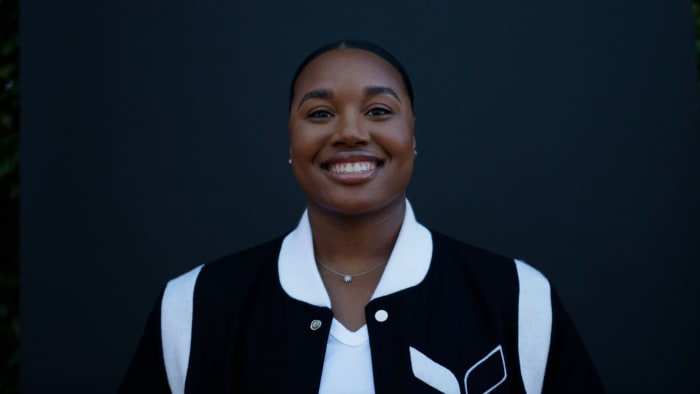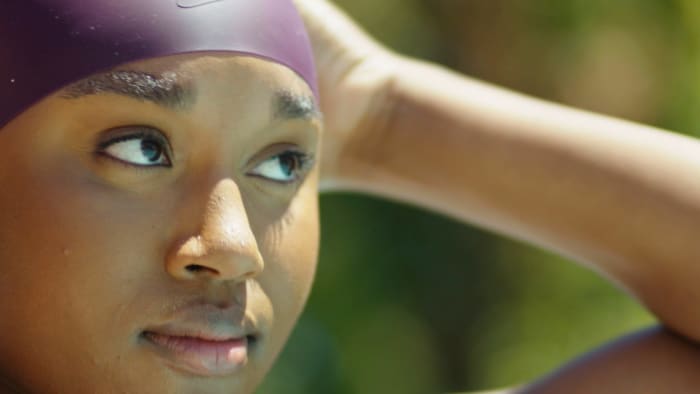Olympic Gold Medalist Simone Manuel on Prioritizing Mental Health as an Elite Athlete

Simone Manuel.
Courtesy of Simone Manuel
Five-time Olympic medalist Simone Manuel started swimming when she was only 4-years-old. She later became the first Black American woman to win an individual Olympic gold medal in swimming at the 2016 games in Rio de Janeiro, Brazil.
Manuel has been breaking barriers ever since while promoting equality for all along the way—the 26-year-old required an inclusion rider when she signed a partnership with an apparel brand several years ago and regularly uses her platform to promote progressive change in her sport.
While she continues to excel both in and out of the water, Manuel learned the hard way how important it is to prioritize both her physical and mental health as an elite athlete.
Battling overtraining syndrome
The freestyle swimmer revealed she was suffering from overtraining syndrome in early 2021, and the diagnosis caused her to reevaluate her lifestyle in order to prioritize her own mental well-being. (Put simply, overtraining syndrome is the result of too much training with too little rest and can result in a number of negative physical and mental side effects).
While Manuel still qualified for the Tokyo Olympics and was part of the team that took home a bronze medal in the 4x100-meter freestyle relay, she then took some much-needed time away from her sport last year.
Manuel, who transferred from Stanford to Arizona State last summer, is hoping to make the 2023 World Championship team and is working toward qualifying for the U.S. Olympic team in 2024, but her major theme for this year—and beyond—is rest.
“I think especially as athletes, we sometimes think that taking rest is a sign of weakness, but with the grueling and daunting schedules that we have, it’s really important to listen to your body, but also your mind when you need to take some time for yourself,” Manuel admits.

Simone Manuel.
Courtesy of Simone Manuel
She says she relies on daily affirmations to ground herself through the inevitable ups and downs of life. Manuel says it’s important to be your own advocate when it comes to managing mental health and listen to your body and mind.
“Sometimes you can feel pressure to continue to train hard or push your body to limits that are far beyond what it should be reaching, and I think it’s really important to advocate for yourself when you do need that rest,” she says.
Manuel shares she’s faced both internal and external pressures to succeed in her sport, which has been draining on her mental well-being.
“Balancing my mental and physical health really is a daily practice and I don’t always have it together,” she says. “I wish I did, but I’m only human, and so it’s really about understanding when I may not be in a good place or when I might be struggling, and having the awareness to use tools to help me get out of that place.”
Creating space for inclusion
In January, TOGETHXR released a documentary, Head Above Water, highlighting Manuel’s journey as a swimmer, including her overtraining diagnosis.
The media company, which is cofounded by Manuel, USWNT’s Alex Morgan, pro snowboarder Chloe Kim and retired WNBA legend Sue Bird, promotes equality and representation through storytelling.
Manuel says she hopes viewers can take something away from the lessons she’s learned regardless of whether or not they’re athletes themselves.
“The story has a lot of layers and it talks a little bit about my experience of being a Black woman in the sport of swimming,” she shares. “I hope that it inspires anybody who may not feel like they fit in or belong in a given space to know that they can be successful in the space, even if they feel lonely, even if they feel discouraged.”
Manuel, who says she didn’t have very many Black female role models in the sport of swimming growing up, looked up to powerhouse athletes outside of her sport like Venus and Serena Williams. She hopes her positioning in her sport today will provide representation for the next generation of athletes.
“I wanted to see that representation of Black people successful in a sport that they were a minority in, and so my goal is to hopefully do that and provide a safe space for young Black boys and girls to feel like they can be successful in the sport,” Manuel says.
She hopes her story resonates with those who identify with any aspect of her experience, whether it be mental health struggles or the feeling of not belonging.
“I just hope that people take away bits and pieces of the story that can relate to their own personal life to better know how to manage it, but to [also] know that they’re not alone,” Manuel says. “I think that is one of the most important things—so many people in this world deal with some of the same things in different ways and to have a sense of community and [to] know that you’re not dealing with [your struggle] alone, I think is something that is really special.”
